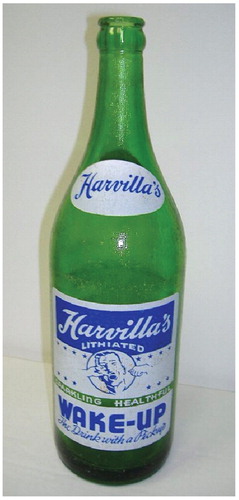Lithiated Lemon-Lime Sodas
Alcoholic hangover, or veisalgia (from the Norwegian kveis , meaning “uneasiness following debauchery,” and the Greek algia , meaning “pain”) (1) , is a common and substantial problem. Common symptoms of hangovers include headaches, malaise, diarrhea, anorexia, fatigue, tremulousness, and nausea (2) . The majority of hangovers (87%) are experienced by light or moderate alcohol drinkers (1) . Morbidity resulting from hangovers (mainly through missed work) has been estimated to cost $3.3 billion in Britain, $7.5 billion in Canada, and $148 billion in the United States (1) . On a personal level, affected individuals frequently attempt to alleviate the symptoms of hangovers by a wide variety of means.
Despite the apparent cost of hangovers, organized medicine has generally avoided treatment for hangovers because of a belief that it may enable patients with alcohol abuse to continue to abuse alcohol (3) . However, although there is no evidence that alleviation of hangover discomfort increases future alcohol consumption (3) , there is evidence that not doing so is associated with an increased likelihood to drink (4) . In an Internet search regarding treatments for hangovers that provided over 325,000 hits, a recurrent theme was alcohol (5) .
The search for alcoholic hangover treatments is not a new phenomenon. In the early 20th century, several products were introduced to fill this niche. In 1929, a new drink was introduced by the Howdy Company called Bib-Label Lithiated Lemon-Lime Soda. Subsequently, the name was changed to 7-Up Lithiated Lemon-Lime and, ultimately, to 7-Up. Although it was clearly a soft drink, the creator of 7-Up, Charles Leiper Grigg, believed that it cured alcoholic hangovers, and it was marketed as such with an early marketing slogan of “It takes the ouch out of grouch” (6) . Lithiated products were common in the early part of the 20th century and were believed by many people to be healthful (7) . The success of 7-Up spawned several similar products. The 1930s and 1940s saw the introduction of such products as “ Wake-Up ,” “Heads Up,” and “B1.” All of these products were lithiated and believed to be helpful for alcoholic hangovers. The lithiated lemon-lime soda B1 even had thiamine added.

1. Wiese JG, Shlipak MG, Browner WS: The alcohol hangover. Ann Intern Med 2000; 132:897–902Google Scholar
2. Harburg E, Davis E, Cummings KM, Gunn R: Negative affect, alcohol consumption and hangover symptoms among normal drinkers in a small community. J Stud Alcohol 1981; 42:998–1012Google Scholar
3. Earleywine M: Personality risk for alcoholism covaries with hangover symptoms. Addict Behav 1993; 18:415–420Google Scholar
4. Earleywine M: Hangover moderates the association between personality and drinking problems. Addict Behav 1993; 18:291–297Google Scholar
5. Pittler MH, Verster JC, Ernst E: Inverventions for preventing or treating alcohol hangover: systematic review of randomized controlled trials. Br Med J 2005; 331:1515–1518Google Scholar
6. Wikipedia: WikiProject Soft Drinks. http://en.wikipedia.org/wiki/Wikipedia:WikiProject_Soft_DrinksGoogle Scholar
7. El-Mallakh RS, Jefferson JW: Prethymoleptic use of lithium. Am J Psychiatry 1999; 156:129Google Scholar



